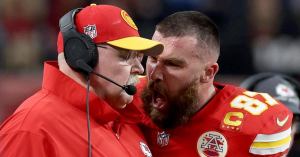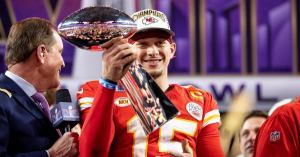Joe Montana knows what Philip Rivers and Drew Brees are going through. Rivers recently announced his retirement from the NFL, and Brees will likely call it a career soon. It’s not an easy decision to make, and when PopCulture.com recently caught up with Montana, he said retiring from the NFL was challenging for him.
“It was very difficult,” said Montana, who played 13 seasons with the San Francisco 49ers and two with the Kansas City Chiefs. “The first two or three years were very hard. You sit there are go, ‘Did I make the right decision?’ [You] question yourself because there’s no going back to it once you called it a day. It’s really hard to have someone else give that opportunity back again. When you look at those guys, there’s no pickup games to go to. Watching every Sunday is hard because you figure you should still be there. It was a tough transition the first couple of years.”
Videos by PopCulture.com
Montana was 38 years old in his final NFL season, which is a typical age for a quarterback to retire. Rivers turned 39 in December and Brees turned 42 in January. And like Montana, Rivers and Brees have nothing to prove, but letting the game go is not an easy thing, especially when you can still play at a high level.
Montana had a solid ending to his NFL career. He played in 14 games for the Chiefs and posted a 9-5 record, completing 60% of his passes and throwing for 3,283 yards, 16 touchdowns and nine interceptions. He led the Chiefs to the playoffs, but the team lost to the Miami Dolphins in the wild-card round.
It was surprising to see Montana in a Chiefs uniform at the time since he won four Super Bowls with the 49ers. It’s similar to Tom Brady signing with the Tampa Bay Buccaneers after spending 20 seasons with the New England Patriots. When asked about his transition from the 49ers to the Chiefs, Montana said it was not very difficult, compared to Brady despite winning the Super Bowl earlier this month.
“When I got to Kansas City, Paul Hackett was the offensive coordinator, and he was with San Francisco when we won our ’84 Super Bowl,” Montana said. “So I knew most of the offense or the understanding of the offense. It was a mix of that offense and Marty Schottenheimer’s offense.” Montana went on to mention having Hall of Fame running back Marcus Allen on the team was big for him. He said: “Marcus Allen was basically a quarterback playing the running back position. The things that he could do running the ball, catching the ball and also helping the young guys understand what it really took and what it was about.”





